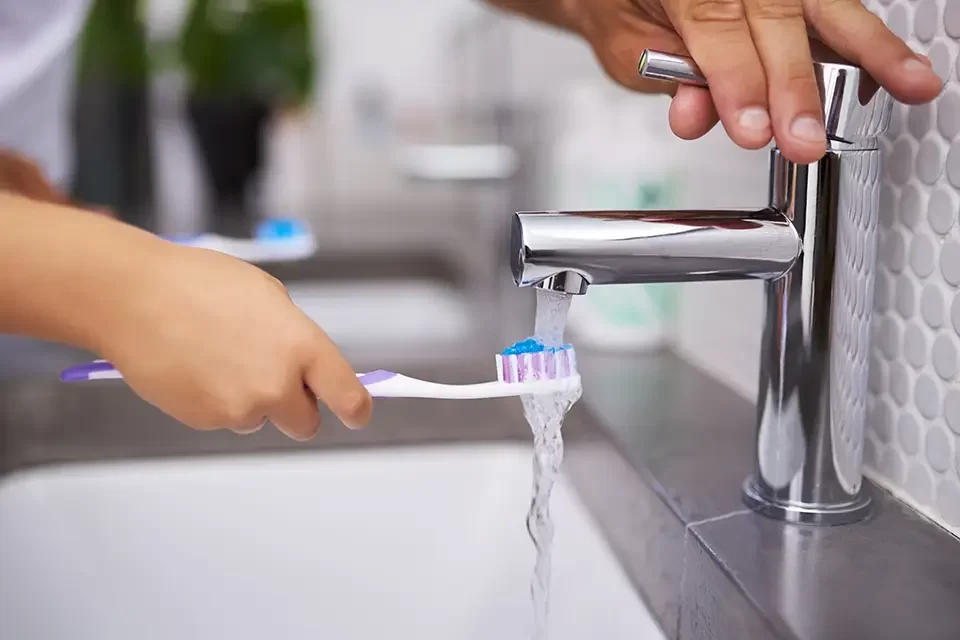Most people don’t stand in front of the bathroom mirror thinking about minerals. They think about the last filling their child needed, a tooth that keeps feeling “weak,” or sensitivity that makes cold water a small shock every time. Somewhere in that mix, the importance of fluoride comes up in toothpaste ads, brief comments from the dental hygienist, or articles that don’t always agree with each other.
At FIFTH ST Dental in Etobicoke, Ontario, we talk about the importance of fluoride with patients every single week. Parents want to protect their kids’ teeth without overdoing anything, adults want to keep the teeth they have, and many people simply want a straight answer in plain English. This guide explains what fluoride does, who needs it most, how it fits into day-to-day life, and how we use it in our practice so you can decide what feels right for you.
What Fluoride Actually Does to Your Teeth
From the outside, enamel looks like a solid shell, but under a microscope, it is constantly losing and gaining minerals. Acids from food, drinks, and bacteria soften the surface; saliva slowly helps it recover. Over the years, that tug-of-war determines whether your teeth stay intact or develop weak spots that turn into cavities.
When fluoride is present in your saliva, it joins the rebuilding process. Tiny areas of softened enamel can re-harden with fluoride-rich minerals, and the repaired surface is more resistant to acid next time. Fluoride can also slow the activity of cavity-causing bacteria, giving your enamel more time to recover between meals.

The Importance of Fluoride in Everyday Brushing
Most of the time, the importance of fluoride shows up in small daily habits, not in big treatments. Your main source is usually toothpaste. Used twice a day, a fluoride toothpaste gives your teeth brief, regular contact with fluoride, which is how enamel prefers to be supported.
In practical terms, that can mean:
- Fewer new cavities appearing between check-ups, especially around old fillings or along the gumline where plaque tends to sit.
- Early “soft spots” seen on X-rays hardening again instead of turning into holes that need fillings.
Mouthrinse and in-office fluoride varnishes build on the same idea. When your risk of decay is higher than average, these extra steps increase the importance of fluoride in your routine without adding much time.
How Fluoride Needs Change Over a Lifetime
The importance of fluoride stays constant, but how you use it changes as life does. A preschooler, a teenager in aligners, and a retired adult on medication do not need identical plans, even if the science behind fluoride is the same.
In early childhood, the focus is on gentle, supervised use. A smear or pea-sized amount of fluoride toothpaste, plus help from an adult, protects baby teeth and supports stronger permanent teeth later. As children grow, they learn to spit, brush more independently, and handle slightly stronger products if needed.
Teenagers and young adults may snack more, drink more acidic beverages, or miss the occasional brushing. If they also wear braces or clear aligners, plaque has more places to hide, so fluoride becomes an important extra level of protection. Later in life, gum recession, dry mouth from medications, and teeth that already carry fillings, crowns, or bridges change the picture again. Here, a prescription-strength toothpaste or periodic in-office fluoride can be a practical way to protect the teeth you have worked hard to keep.
Who Benefits Most from the Importance of Fluoride
Everyone with natural teeth gains something from fluoride, but some people rely on it much more than others. At FIFTH ST Dental, we look at your specific situation before recommending how strong a role the importance of fluoride should play in your routine.
A few groups stand out:
- Frequent Cavity History: If new decay keeps appearing between visits, extra fluoride can help shift that pattern and stabilise your mouth over time.
- Dry Mouth and Health Conditions: Reduced saliva from medication, health issues, or cancer treatment makes acid damage more likely, so fluoride becomes a key part of protection.
- Orthodontic and Aligner Patients: Brackets, wires, and attachments create extra plaque traps, so fluoride support is especially helpful around those areas.
Children still learning to brush also benefit from the importance of fluoride as a safety net while their technique and habits catch up. The key is matching the type and amount of fluoride to age, risk, and comfort level rather than treating everyone the same.
Costs, Prevention, and the Importance of Fluoride
When people ask about cost, they are often really asking if something is worth building into their routine. With fluoride, the answer usually comes down to prevention. A tube of fluoride toothpaste, an occasional in-office varnish, or a prescription product typically costs far less than a filling, crown, or root canal that might have been avoided.
You will usually see fluoride-related costs in three places: everyday toothpaste and rinses, professional applications during hygiene visits, and higher-strength products for people with a significant risk. Exact fees vary with product choice, how often you need it, and your broader treatment plan, but when the importance of fluoride is built into a sensible preventive plan, you are more likely to keep your own teeth longer and spend less time dealing with avoidable problems.

How FIFTH ST Dental in Etobicoke Uses Fluoride
At FIFTH ST Dental in Etobicoke, we do not assume that everyone wants or needs the same fluoride plan. We start with a detailed look at your mouth: your cavity history, X-rays, areas of wear, diet, medications, and how you actually brush and floss at home. Then we talk through the importance of fluoride in the context of your real life.
For some patients, that conversation confirms that a standard fluoride toothpaste and regular check-ups are enough. For others, we might recommend in-office varnish at cleanings, a prescription toothpaste at night, or targeted fluoride for sensitive spots. With families, we focus on how much toothpaste to put on a child’s brush, how to help kids spit instead of swallow, and how to keep routines realistic on busy mornings and evenings.
Conclusion
Fluoride has been part of dentistry for decades, but that doesn’t mean you should simply accept or reject it without a clear explanation. Once you understand how it supports enamel repair, how your needs change over time, and where the importance of fluoride is greatest, decisions become easier.
If you are unsure whether you or your child is getting the right level of fluoride, the easiest next step is a straightforward conversation. At FIFTH ST Dental in Etobicoke, Ontario, we can examine your teeth, review your habits, and design a preventive plan that uses fluoride in a way that feels safe and practical for your family. Stronger teeth rarely depend on one big treatment; they depend on small, informed choices repeated over years.
FAQs
Is fluoride equally important for children and adults?
The principle is the same, but children need smaller, supervised amounts, while many adults need extra support because of dry mouth, past decay, or gum recession.
Can toothpaste alone provide enough fluoride?
For people with low to moderate decay risk, twice-daily brushing with a fluoride toothpaste is often enough, while higher-risk patients may need rinses, in-office varnish, or prescription toothpaste as well.
What if my drinking water doesn't contain much fluoride?
Then toothpaste and other products become more important sources, so using fluoride consistently in your home routine matters more.





